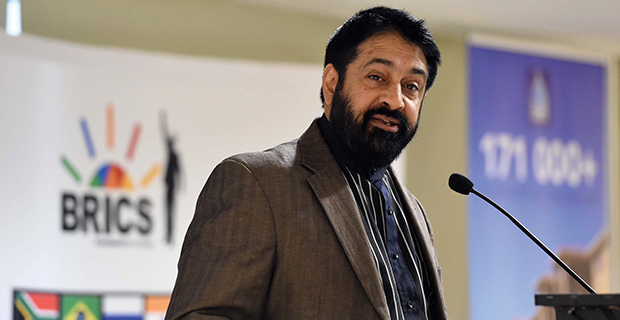“Wish to make ties more visible”
Ambassador Anil Sooklal is the South African High Commissioner designate to India. A descendant of Indian indentured workers from Uttar Pradesh, he is a double PhD, including a doctorate in Hindu Studies, the first South African to receive one. He wishes to expand extensively on commercial ties between the two nations for which the India-South Africa Chamber of Commerce has been established. He firmly believes that the level of bilateral trade and investment should double swiftly. He says that a lot is happening between India and South Africa but mostly people are unaware of it. He wishes to bring in much more visibility into the relationship. He spoke to Bula Devi, Consulting Editor (International Affairs), on a range of subjects before his arrival in India.
We understand that your grandfather migrated to South Africa as a sugarcane plantation worker from Uttar Pradesh in 1893, the same year that Mahatma Gandhi went there as a lawyer. Could you throw light on your family history?
The British exported labourers after 1834 and since then the labourers were called indentured. The export of indentured labourers continued till 1911 and finally the system was abolished under pressure from Indian government entities and others since it was an “unacceptable” form of labour. In January 1893, my great grandfather and his family, including his wife and three children, arrived from a village in Ghazipur in Uttar Pradesh in a ship called Pongola 15. They arrived at a place which was then called the province of Natal in the city of Durban where I currently reside. They were assigned to a sugarcane plantation site in a place called Ixoko. These sugarcane plantations were owned by the white farmers and the indentured labourers had to work in extremely difficult conditions.
The indentured labourers had a five-year contract with the owners. On the completion of the five-year contract, the labourers were given the choice to attain passage to India or were given land in South Africa worth the value of their labour. My great grandparents decided to remain in South Africa and they went into farming. My late father went into business. My parents paid a great deal of emphasis on education. I have five siblings. While both my parents could not complete higher education because they had to assist in the family’s upbringing, they ensured that I and my siblings went for higher education. I am a double doctorate. I was the first student in the University of KwaZulu Natal to obtain a double PhD and the first person to do a Ph.D in Hindu studies in South Africa. Then while I was completing my education, I was offered a lectureship at the University of South Africa.
Under apartheid, universities were segregated according to race groups. I was the first person of Indian origin to have been appointed as a lecturer, as a staff member, in the University of South Africa. Subsequently, I took up a lectureship at the University of Kwazulu Natal where I spent 10 years, lecturing on Indian philosophy and history. During this time I was actively involved in our struggle against apartheid. I worked with the African National Congress and other resistance movements during this time. I was quite an activist in the movement. My whole philosophy was based on the Bhagwat Gita and Sri Krishna’s teachings to stand up for dharma. For me, the apartheid regime was an ‘adharmic’ force. I was inspired by the teachings of Sri Aurobindo, Subhash Chandra Bose, etc, how they stood up for India’s independence and freedom, and the values and principles that inspired them to fight against colonialism and British rule. It resonated within me in my fight against apartheid, it was an unjust system against humanity. I was recognised as a community leader, an activist.
We understand that your family was also very active during the anti-apartheid movement…
My entire family — my wife, my father-in-law — came from an activist background. My wife’s family also came to South Africa as indentured labourers from Uttar Pradesh and Bengal.
You have a long association with India. You have spoken at the Pravasi Bharatiya Divas, been posted at the Mission in New Delhi and have been associated with the RIS and Brics. How excited are you to take up the role of South Africa’s High Commissioner to India?
I think there is great rejoicing especially in the Indian community and the black community as a whole because this is the first time in 30 years that an Indian origin person has been appointed as the High Commissioner. I am extremely excited because I had specifically told my government that my only interest to go out as an Ambassador would be to India. I am fortunate that my President agreed. I was born in Africa, raised in Africa and Africa is in my blood but at the same time so is India because my heritage, my religion and my ethnicity is all derived from India. So, in me it is a marriage of India and Africa and both are close to my heart. It is an opportunity to represent my country in the land which my great grandparents departed and came to South Africa. I think it is an emotional and befitting tribute to all the challenges and pains suffered by those who went to South Africa as indentured labourers.











Comments.